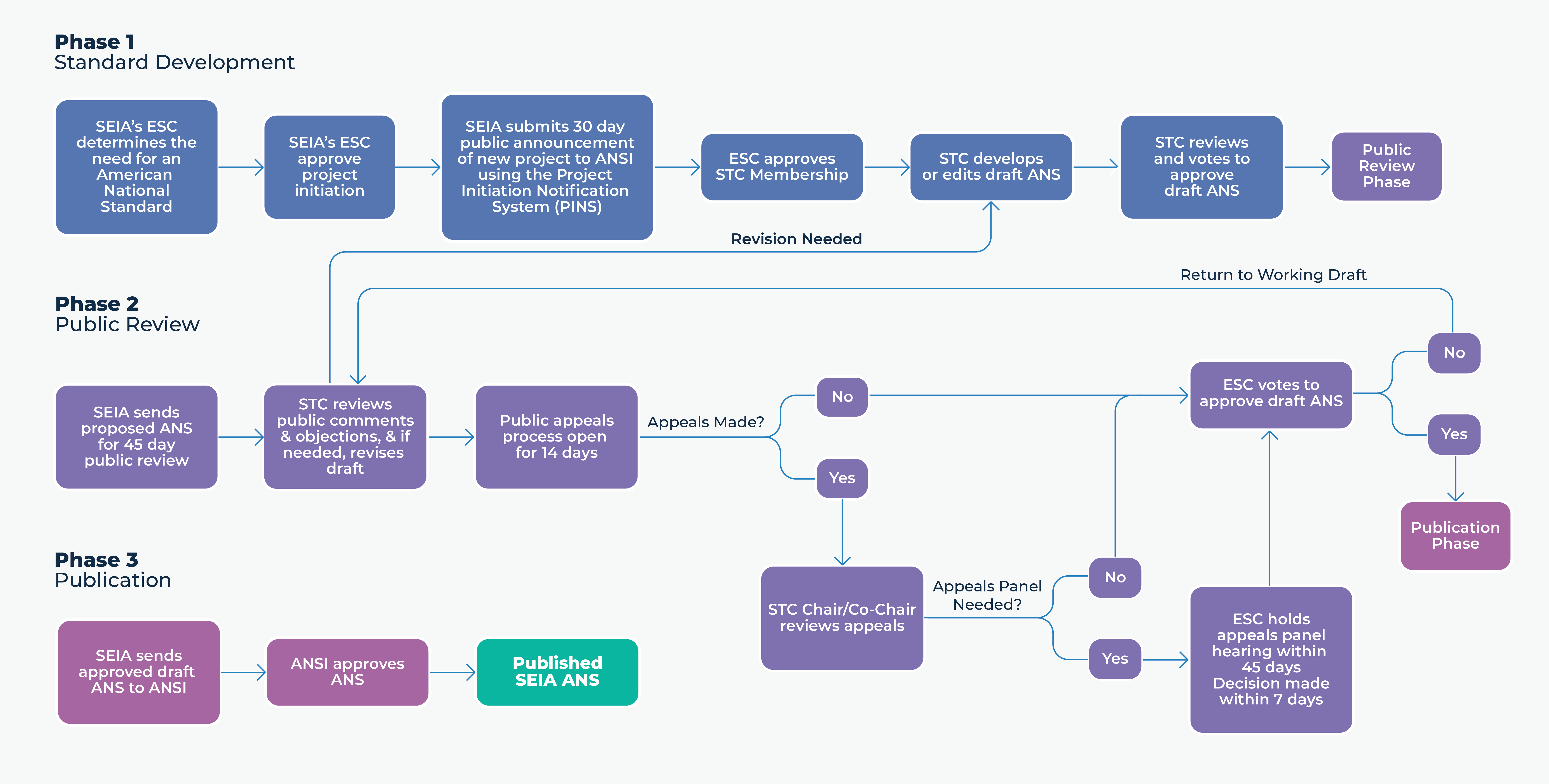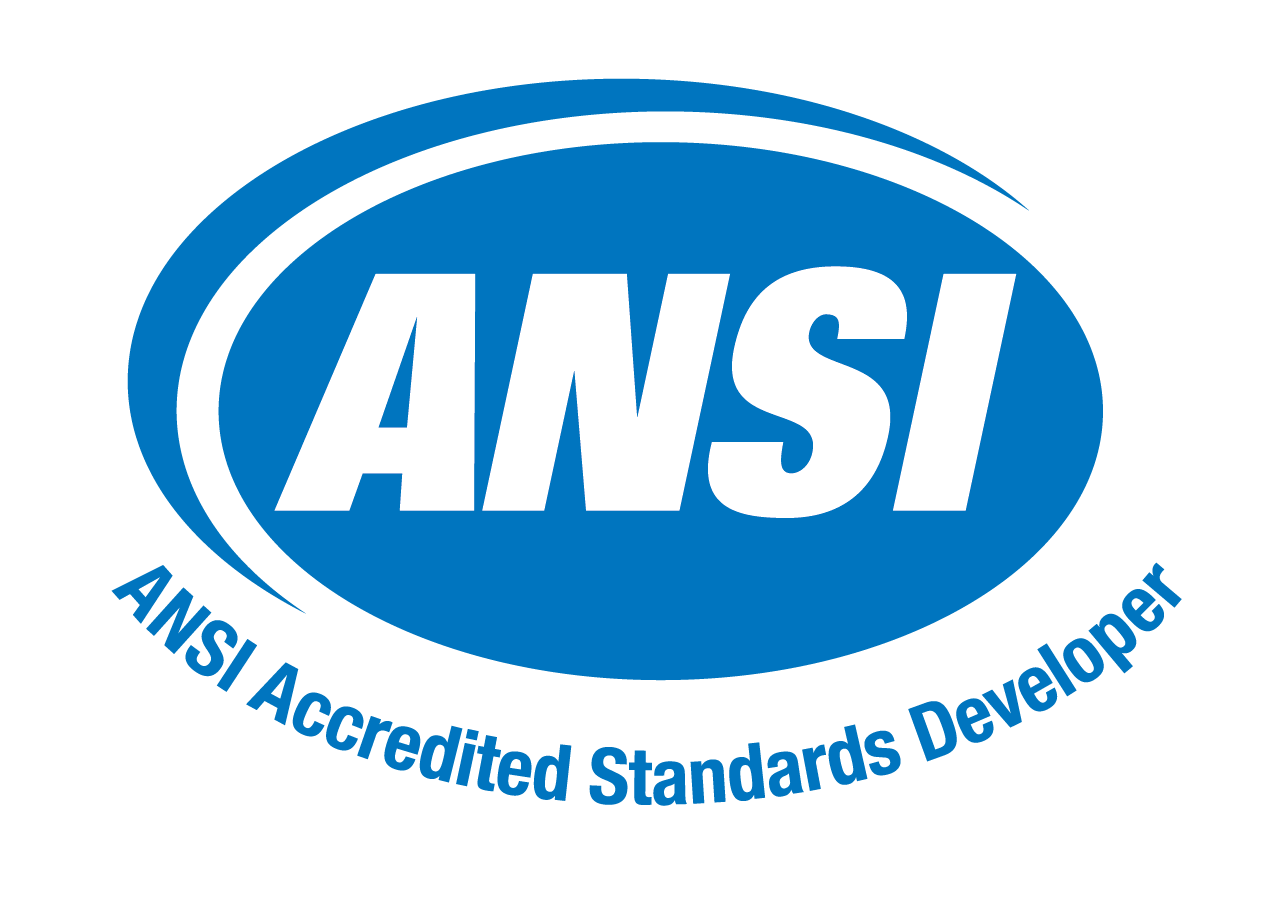Standards Development
SEIA is taking steps to mitigate risks and lead the solar and storage industries by developing national standards that will build upon SEIA’s Solar+ Decade goals. By developing accredited national standards, SEIA is proactively tackling issues that build confidence among customers, regulators, investors, rating agencies, and other stakeholders. These standards will contribute assurance that solar and storage systems have been ethically, sustainably, and responsibly sourced, manufactured, transported, installed, operated, and recycled.
Accreditation
American National Standards Institute
The American National Standards Institute (ANSI) administers and coordinates the U.S. voluntary standards and mandatory standards for a wide range of topics. Standards drive efficient and open markets that help to reduce costs and build confidence among customers, regulators, investors, and other stakeholders. ANSI has found that “standards and technical regulations impact up to 93% of global trade”.
SEIA’s standards development process is accredited by ANSI, with the result that SEIA can create standards that carry the American National Standard (ANS) designation. This designation means that users of the standard are assured that the standard have been developed under a process that conforms to certain requirements including adherence to globally accepted principles of openness, lack of dominance, balance, coordination, and harmonization, etc. SEIA standards set objective criteria to assure that solar and storage systems have been ethically, sustainably, and responsibly sourced, manufactured, transported, installed, operated, and recycled. And the ANSI Standards Development Organization (SDO) designation means that users of these standards are assured that the standard has been developed under an open, fair, and inclusive process.
SEIA Standards Overview
SEIA standards are developed under a process that consists of multiple steps of development, review, and approval by industry experts and other stakeholders such as producers, users, academia, scientists, technical societies, consumer groups, environmental groups, government agencies, and other subject matter experts. The SEIA standards process is accredited by the American National Standards Institute (ANSI), which means that SEIA standards can be further approved as American National Standards (ANS).

Executive Standards Committee Leadership Team
The Executive Standards Committee is the guiding body responsible for management and oversight of SEIA’s standards.
Standards Resources
- The Standards Development Policy and Procedure
- Standards Technical Committee Application
- Standards Public Review Comment Form
- Proposal Objection Form
- Interpretation Request Form
- Standards Proposal, Amendment or Revisions Form
- Procedural Appeal Form
Appeals
Appeals related to any decisions made, or actions taken or not taken, are handled in accordance with the appeals process found in section 7.0 of the SEIA’s Standards Development Policy and Procedure document.
Measurement Policy
All SEIA Standards use U.S. customary units of measurement or international units of measurement.
Patent Policy
SEIA’s Executive Standards Committee and Standards Technical Committees will comply with the ANSI Essential Requirements patent policy outlined in Section 3.1.
Interpretations
Requests for written interpretations must be submitted in writing to the Executive Administrator and sent to [email protected]. The Executive Administrator will provide an Interpretation Request Form (IRF) to the requesting party. The completed IRF shall include a statement with specific references to the Section number of the Standard requested. Additional details on the interpretation process can be found in section 8.0 of the SEIA’s Standards Development Policy and Procedures document.
ANSI/SEIA Standards
- SEIA 101: Solar and Energy Storage Supply Chain Traceability Standard
- SEIA 201: Solar and Energy Storage Installation Requirements Standard: Residential and Small Commercial Systems
- SEIA 202: Solar and Energy Storage Installation Requirements Standard: Residential and Small Commercial Systems Installer Training
- SEIA 251: Solar and Energy Storage Installation Requirements Standard: Large Commercial and Industrial Systems
- SEIA 252: Solar and Energy Storage Installation Requirements Standard: Large Commercial and Industrial Systems Installer Training
- SEIA 301: Solar and Energy Storage Operations and Maintenance Standard: Technician Training
- SEIA 401: Solar and Energy Storage Consumer Protection Standard
- SEIA 501: Solar and Energy Storage Environmental, Health, and Safety Standard: Installer and Technician Training
- SEIA 601: Solar and Energy Storage Equipment Decommissioning Standard
- SEIA 602: Solar Equipment Minimum Requirements for Recyclers
- SEIA 603: Solar Equipment End-of-Performance / End-of Life Management Standard
How to Participate
It is part of SEIA’s mission to promote diversity and inclusion in the Solar Industry. For this reason, SEIA ensures all voices are heard within SEIA’s standards activities. For this purpose, participation is open to any individual or affected or interested party in the standards development process.
The following opportunities for participation are available:
- Submission of a new proposal for a industry standard.
- Voting membership in a Standards Technical Committee (STC) to develop, review, and approve the publication of the SEIA standard.
- Review and comment on the draft standard via the public review announced by SEIA, or via the reviews announced by ANSI.
Submission of proposals for new standards activities
Any person or organization, whether a member of SEIA or not, may submit an idea or proposal for a new standards activity. The proposal will be reviewed by the ESC. Approved proposal will be forwarded to the applicable STC, based on the topic of the potential work, for consideration. All submissions will be acknowledged. The proposal should include a detailed description of the market or industry issue or problem to be addressed, a scope of work, and how the proposed standard will address that problem. The STC may follow up with the submitter for clarification or to ask for additional information.
Ideas and proposals for new SEIA standards activities should complete the Standard Proposal, Amendment, or Revisions Form and must submitted to [email protected].
Participate in the Standards Technical Committees
By bringing together industry experts and other stakeholders, SEIA standards improve the functionality of solar, energy storage, and other renewable energy generation and transmission. Participating in SEIA standards offers companies, investors, insurers, contractors, academia, the general public, and other stakeholders that are directly impacted, the opportunity to influence the standards development process.
SEIA’s Consensus Bodies are represented by the established STCs which are composed of experts, both SEIA members and non-members, who provide the final review and approval to publish SEIA American National Standards (ANSI).
It is part of SEIA’s mission to promote diversity and inclusion in the solar and storage industry, and for SEIA it is vital that all voices are heard during the standards development process. For this purpose, a balance of interests is required among the consensus body membership; no one interest group can constitute a majority of members of the consensus body. As such, SEIA invites and welcomes participation from a broad range of stakeholder interests, and any individual interested in or affected by SEIA standards or employed by or representing an organization interested in or affected by SEIA standards, may join a STC.
SEIA’s STC interest group categories are as follows:
- Producer Interest – Individuals that represent an entity that produces or assembles products or materials in the identified SEIA Policy and Standards Development Procedure. These may include manufacturers and distributors.
- User Interest – Individuals that represent the interests of an entity which is directly involved in designing, constructing or in the use or operating. These may include developers, design consultants, contractors, applied research laboratories, building owners, investors, insurance companies, inspection agencies, and product certification agencies.
- General Interest – Individuals that represent the general public. These may include academia, scientists, technical societies, consumer groups, industry associations, environmental groups, government agencies, and other subject matter experts.
Any individual interested in or affected by SEIA standards or employed by or representing an organization interested in or affected by SEIA standards, may join a STC.
To join a STC:
To apply for an open position on one of the STC Consensus Bodies, or to be added to the waiting list of candidates when there are no current openings, please submit your name, resume, the SEIAs STC you are interested in, your Interest Category, and complete the Standard Technical Committee Application.
Participate in Reviews
SEIA draft standards are open for public review upon the completion of its development and approval by the STC. All stakeholders (i.e., people or organizations interested in or affected by the standard) are invited and encouraged to participate in the review process.
Public review announcements are issued through ANSI Standards Action publications and here.
Reviewers should submit their comments using the form available here. The information required should include both the identification of the problem and a recommended solution.
Feedback and New Proposals
SEIA encourages all interested stakeholders to provide technical comments on proposed standards during the announced formal public comment periods. This critical part of the open development process ensures that a consensus of those directly affected by the standards has been achieved.
All feedback within the scope of SEIA Standards must be submitted to the SEIA Executive Administrator. Proposals without adequate justification risk rejection or referral to originator.

Related News
Leading the Charge: The Top 5 Solar States of 2023
Solar is coming off a landmark, record-shattering year in 2023. To celebrate this momentous year, SEIA is counting down the top five solar states of 2023 — all of which are positioning themselves as national leaders in America’s energy economy.
Solar Installations Skyrocket in 2023 in Record-Setting First Full Year of Inflation Reduction Act
WASHINGTON, D.C. — The U.S. solar industry added a record-shattering 32.4 gigawatts (GW) of new electric generating capacity in 2023, a 37% increase from the previous record set in 2021 and a 51% increase from 2022. According to the U.S. Solar Market Insight 2023 Year-in-Review released today by the Solar Energy Industries Association (SEIA) and Wood Mackenzie, solar accounts for 53% of all new electric generating capacity added to the grid last year.
Raising the Bar for Consumer Protection Work in the Solar and Storage Industry
Solar remains one of the most popular energy sources across America, and millions of Americans have already made the switch to solar. This surge in demand means even more Americans will consider solar or solar plus storage for the first time in the near future, making this the right time to double down on consumer protection.